Bridging the gender gap in venture capital
On July 17th, the Atlantic Council’s empowerME Initiative, in collaboration with the United States Embassy in the United Arab Emirates (UAE) and Abu Dhabi Global Market (ADGM), held a debut workshop in a series of four for the first ever Women Innovators Fellowship (Win) cohort in the country. The event focused on the significance of venture funding for women entrepreneurs in the UAE and took place both virtually and in-person at Abu Dhabi Global Market offices.
The workshop opened with insightful remarks from Daleya Uddin, Head of Public Affairs and Outreach at the United States Embassy to the UAE. This set the stage for a compelling exchange between Amjad Ahmad, Chairman of empowerME, and H.E. Yousef Al Otaiba, Ambassador of the United Arab Emirates to the United States.
The event also included a moderated discussion featuring Alifia Doriwala, Co-Chief Investment Officer RockCreek; Huda Al-Lawati, Founder & CEO, Aliph Capital; Zahra Rabih El Zayat, Chief Commercial Officer, evision e& Life – e& group. Lynn Monzer, Associate Director of the WIn Fellowship at the Atlantic Council moderated the session.
These panelists shared their insights into the existing challenges facing women in the UAE when it comes to venture funding, examined the transformative impact of women-specific programs, and explored strategies for boosting female participation and leadership in venture and growth capital.
Key Discussion Points
Amjad Ahmad, Chairman of the empowerME initiative at the Atlantic Council, kick-started the event by addressing a paradox within the UAE’s gender landscape. He noted that while women account for 70 percent of all university graduates in the country, they still face a sizable gender gap in entrepreneurial ventures. As per the Global Entrepreneurship Monitor, for every five men initiating a business, there are only two women. This discrepancy prevails despite the UAE’s standing out as a regional leader in gender equality, according to the Global Gender Gap report. While this progress is noteworthy, it also emphasizes the need to promote further representation and opportunities for women in venture capital and entrepreneurship. Most importantly, we must foster more women in venture capital and private equity, according to Ahmed.
In her welcoming speech, Daleya Uddin expressed her strong support for the WIn Fellowship, underlining the critical importance for women to access to venture capital. She emphasized that “by ensuring that women are economically empowered, we are also ensuring that they invest in their families, communities, and economies”. As women are “better equipped with the necessary resources, they catalyze economic growth and foster societies that are more stable and resilient”, she added.
During the keynote conversation, H.E. Ambassador Yousef Al Otaiba shed light on the UAE’s strategic push to drive entrepreneurship as a conscious effort to diversify beyond fossil fuel economy. He pointed out that “technology is the new future”, which means that the UAE must adapt, modify, and adjust its systems, structures, and financing in order to meet the needs of the future. He also emphasized the role of education in nurturing a risk-taking mindset and promoting entrepreneurship. Ambassador Al Otaiba touched on the cultural challenges hindering shifting attitudes towards women entrepreneurship in a society which traditionally values the stability offered by government jobs. Despite these challenges, he affirmed the UAE’s forward strides in this regard, citing the growing interest in entrepreneurship and innovation among the youth. On the needed strategies for boosting entrepreneurship in the UAE, Ambassador Al Otaiba stressed the necessity for robust public-private partnerships, as well as the establishment of more dedicated funds and incubators, specifically targeting women.
During the panel discussion, Alifia Doriwala highlighted Rock Creek’s strategy and its $300 million mandate from the Canadian government’s Equality Fund Portfolio to add a gender lens in investing in both the private and public sectors. Doriwala stressed that the fund focuses on demonstrating to investors that they can make a return on their investments while also advancing gender equity. This has led to the creation of more funds and products that are focused on gender lending, which were not available to investors before this mandate. Furthermore, due to the lack of women targeted funding, Rock Creek created a private debt strategy that specifically targets debt financing for women entrepreneurs in North America with no easy access to traditional capital. This fund is currently generating an eight to ten percent return, which is in line with any of its peers, according to Doriwala.
Huda Al-Lawati echoed Ambassador Al Otaiba’s sentiments, affirming that the government currently leads the charge in fostering and facilitating women’s participation, outpacing the private sector in these efforts. She highlighted three key challenges that women entrepreneurs in the region face. The first being cultural factors that can discourage women from taking risks or starting businesses; then comes the education system that promotes government jobs at the expense of the entrepreneurial spirit; and lastly, the regulatory environment that has strict bankruptcy laws, making it difficult for businesses to fail, which can significantly increase the risk of doing business.
Zahra El Zayat highlighted the development in venture funding, noting the recent inclusion of sustainability and gender equity as key investment criteria—a marked departure from previous practices. However, she also pointed out that women rarely submit their pitches for funding due to limited access to key networks—often male dominated. She also added that “there is constant pressure on women to finish their education and start a job rather than taking risks”.
Lynn Monzer explained that the common fear of failure can significantly discourage women from starting their own ventures. She raised concerns about the underrepresentation of women in venture capital boards and the existing homogeneity among investors. These factors can both dissuade women from pitching their ideas and contribute to an environment where women’s ideas are not given equal consideration to those proposed by men.
Regarding women’s specific programs and strategies in promoting gender equity and venture funding, Doriwala referred to existing research that highlighted the importance of women representation in venture capital (VC), where the more women you have in top GP positions in venture funds the more funding will go towards women entrepreneurs without the need for an explicit mandate. She stated that “relationship and networking is the entire essence of what venture funding is.” She further added that many women entrepreneurs do receive venture funding and accelerator capital but there is still very limited growth capital for them to continue the expansion curve.
Al-Lawati pointed out the significant role of unconscious biases—be it in AI or funding decisions. She noted the limited data on investment returns from women-led businesses as a major barrier to funding these ventures. She highlighted the work of Aliph Capital, where they publicly share data on the performance of companies with women in leadership roles, aiming to prompt positive changes in investment attitudes. Aliph Capital, she emphasized, “requires diversity from their partners to promote fairness”.
El Zayat celebrated the growing number of female role models and success stories inspiring women entrepreneurs in the region. She also pointed out that this helped uplift and scale the abilities of women in the region. She also highlighted the importance of remote work as an enabler for women in the region, helping them create a better work-life balance, which was not possible before the rise of emerging technologies.
All three panelists, El Zayat, Al-Lawati, and Doriwala, offered strategies to support female entrepreneurship in the UAE. El Zayat emphasized the importance of education and board service. She argued that providing women with access to education and opportunities to serve on boards would help increase their participation in the economy and create a more level playing field for female entrepreneurs. Al-Lawati, from her side, stressed the role of family in encouraging women starting a business. Drawing from her personal story, she noted the critical role families play in shaping women’s aspirations and that they should be encouraged to support their daughters’ entrepreneurial dreams. Doriwala chose to call on institutional investors to allocate more capital to women-led businesses. She argued that there is a large pool of capital available for investment, and that investors should be more willing to put their money into businesses led by women. She also called on investors to release more data on the performance of women-led businesses, in order to demonstrate their viability.
Concluding Notes
According to an analysis by the Boston Consulting Group (BCG), global GDP could witness an approximate rise of 3 percent to 6 percent if women and men participated equally as entrepreneurs, which could mean an impressive $2.5 trillion to $5 trillion boost to the global economy.
The argument is clear: not only do women-owned businesses generate employment and stimulate economic growth, but they also have a significant influence on local communities. However, women remain the largest untapped talent in the world. They continue to face numerous challenges, from ingrained societal norms to barriers to accessing finance. Intriguingly, the economic disparity persists even though startups founded and co-founded by women generate 10 percent higher cumulative revenue over a five-year period, amassing $730,000 compared to the $662,000 accumulated by men.
Venture funding plays a major role in de-risking the innovation process by taking a bet on promising concepts by furnishing bright individuals with the resources to bring their ideas to the market. This in return, promotes innovative technologies, grows businesses, and contributes to economic development and competitiveness by helping firms commercialize new ideas.
The workshop featured the considerable work that the UAE government and institutions have done to increase women’s entrepreneurship and improve access to finance. It also shed light on the significant systemic and cultural barriers that female entrepreneurs in the UAE still confront when accessing financing. In 2021, less than 1 percent of the $3 billion invested in the Middle East and North Africa (MENA) was allocated to women-founded startups. The panel discussion highlighted two main barriers:
- The lack of networks that could provide women with access to funds and information, as the networks that facilitate women’s access to these indispensable tools remains deficient. As per one study, in spite of the escalating number of female entrepreneurs in the MENA region, about 25 percent of the respondents reported facing challenges in networking. These individuals perceived networking events as being dominated by “old boys clubs”—environments where they felt a sense of discomfort and exclusion.
- The underrepresentation of women on venture capital boards. Although it’s hardly surprising that there’s a gender disparity in startup fundraising, the gap remains as pronounced as ever for women aspiring to attain leadership positions in venture capital firms—even as women have managed to rise in various other sectors.
The workshop concluded that women in the UAE hold vast and largely untapped potential. By engaging women entrepreneurs and providing them with easier access to the funding, the country can not only enrich its entrepreneurial landscape and fortify its economy, but also transform gender equity. Governments, financial institutions, and society at large are responsible for breaking down existing barriers and creating a supportive and equitable environment for women to grow, agreed the panelists.
Lynn Monzer is the Associate Director with the Atlantic Council’s empowerME initiative at the Rafik Hariri Center for the Middle East.
Nibras Basitkey is the Program Assistant with Atlantic Council’s empowerME initiative at the Rafik Hariri Center for the Middle East.
Related content
Explore the WIn Fellowship
Sponsors & in-country partner


empowerME
empowerME at the Atlantic Council’s Rafik Hariri Center for the Middle East is shaping solutions to empower entrepreneurs, women, and youth and building coalitions of public and private partnerships to drive regional economic integration, prosperity, and job creation.
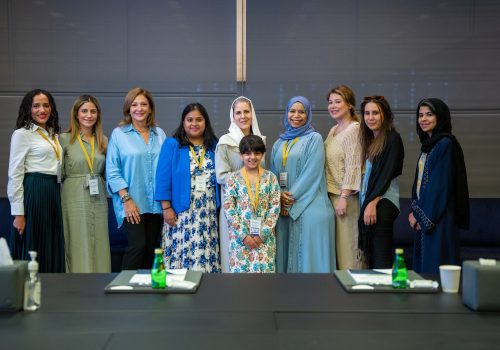
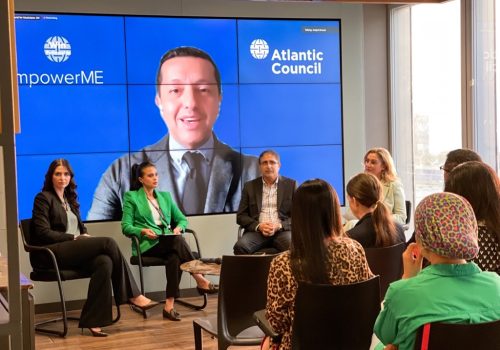
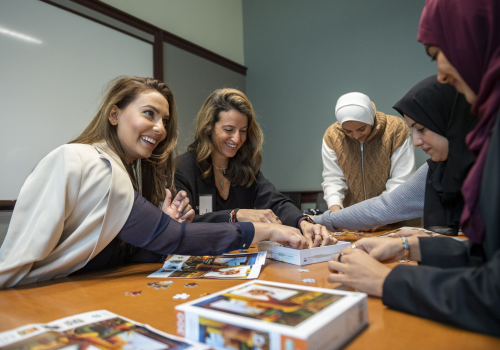
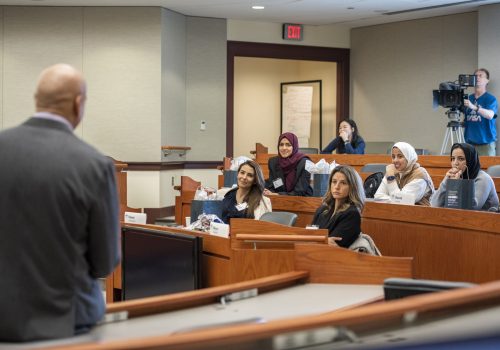
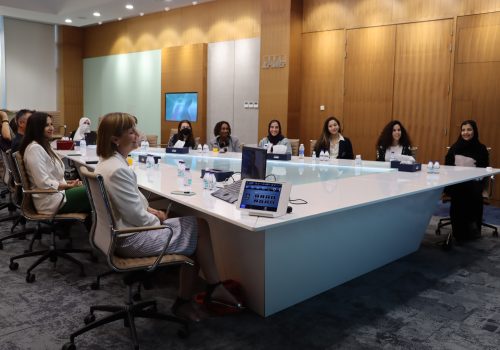
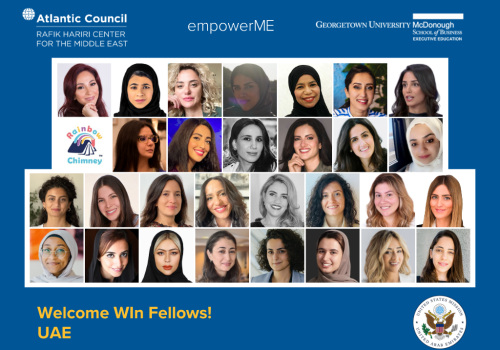
Follow the conversation on social media with @ACMideast and using #ACempowerME